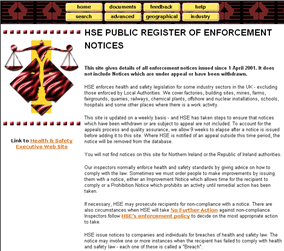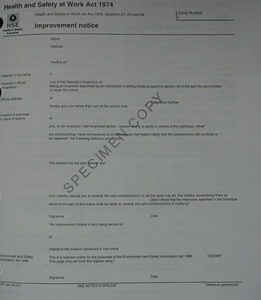10 Key facts about HSE notices
 I was having a discussion last week with somebody about the official forms the HSE issue, Prohibition Notices, Improvement Notices and Fee For Intervention.
I was having a discussion last week with somebody about the official forms the HSE issue, Prohibition Notices, Improvement Notices and Fee For Intervention.
I was being asked:
- Why you get one of these?
- Can you appeal if you think it isn’t fair?
- Can the HSE issue an improvement of prohibition notice and a Fee For Intervention or are they separate?
So this article looks at the Prohibition and Improvement Notices and gives you 10 Key Facts about both of them.
This week’s 2 recent HSE cases look at firms fined for Health & Safety Failings.
- Bernard Buck continued the re-roofing work at Premier Motor Company’s Manton Lane site with subcontractors, without adequate means in place to prevent falls.
- Natural Insulation Ltd (formerly Black Mountain Insulation Limited) failed to conduct an adequate risk assessment for the processing of hemp. They also failed to adequately guard machinery.
As ever, if you have a subject that you would like us to cover one week, please contact us by phone 01458 253682, email or via our Facebook page or by Twitter
My 10 Key Facts about Prohibition Notices
Media coverage of health and safety accidents in the Workplace would have you believe two untruths:
What is it? 
A Prohibition Notice is a formal document that can be served by any inspector appointed under the Health and Safety at Work (HSW) Act 1974 – so that means Health and Safety Executive (HSE) inspectors as well as local authority Environmental Health Officers (EHOs).
Who gets it?
The Notice might be served on an individual, or the company, or both. Most commonly they are served on the employer, normally the company, or the person (e.g. supervisor) directly in charge of the work. If you are sole trader or a partner, you can expect it to be served on you personally. If you are a partner, don’t forget to inform your fellow partners, as, in law partners are jointly and severally liable for the partnership’s affairs.
What does it mean?
The Notice confirms the inspector’s view that you are carrying out an operation where there is an imminent risk of serious personal injury and that you must stop it immediately − until you have taken remedial action (this might be repairs or the implementation of specific safety precautions).
Examples would include:
- use of unguarded machinery,
- live working on electrical equipment and
- work on a fragile roof without use of suitable crawling boards.
The notice will make it clear what action you should take. So, for example, work on the fragile roof would be allowed to continue once the required crawling boards were made available and put into use.
What about legal requirements?
Breach of legal requirements is not required for the inspector to serve a valid Prohibition Notice on you, but if he/she believes you are breaching the law (and if you are creating an immediate danger it’s likely to be contrary to at least one piece of health and safety law), that should be stated in the notice.
Deferred Notices.
Prohibition Notices normally take effect there and then but in some circumstances they can be ‘deferred’, for example, if the risk is not imminent, or if it would cause a greater danger to shut down a process straight away. Either way, the notice will make it clear, and if you are in any doubt, check with the inspector. But there is no period of grace to comply, as would be the case with an Improvement Notice.
Making an appeal.
If you wish to appeal to the employment tribunal, you have 21 days to do so. Should you appeal though, the notice remains in force until the tribunal hearing. The tribunal then has the power to reject, uphold or amend the notice.
Appeals – what does the tribunal consider?
If you appeal, the tribunal will focus on whether the notice was lawfully served. For example, was the inspector correct to believe there an imminent risk of serious personal injury?
Since the key word is ‘risk’ (= potential danger), you could not use the fact that no accident had occurred as grounds for appeal.
Offences.
It is a criminal offence to fail to comply with a Prohibition Notice. Courts tend to punish these cases severely as they take the view that since you’ve been given the opportunity to comply, the fact that you haven’t is a serious matter – especially as by definition, there was imminent danger.
You can therefore expect the fine to be higher than if no notice had been served. You should certainly take legal advice if there is any likelihood of prosecution.
Fee for Intervention.
If your enforcing authority is the HSE, you can also expect to be invoiced for the inspector’s time at the current rate of £124 per hour under the HSE’s ‘Fee for Intervention’ (FFI) scheme. This is quite separate from any fines or court costs that may be imposed and applies whether or not you comply with the notice.
But, as with an Improvement Notice, you can minimise these costs by complying quickly and hence not making the inspector spend more time with you than is necessary!
Action Required.
You can resume work as soon as you have taken the action the notice requires you to take, even though the inspector has not yet visited to check. Do though be very clear (by asking the inspector if necessary) that what you plan will be accepted, because not complying is such a serious matter. The outcome to avoid at all costs is that you resume work believing you’ve complied but the inspector doesn’t agree – leaving you facing the very serious charge of ‘not complying with a Prohibition Notice’ contrary to s.33 of the HSW Act. Wherever possible, therefore, it’s smart to wait for the inspector to confirm that what you’ve done is OK before resuming the prohibited activity.
My 10 Key Facts about Improvement Notices
What is it?
An Improvement Notice is a formal document that can be served by any inspector appointed under the Health and Safety at Work (HSW) Act 1974 – this means Health and Safety Executive (HSE) inspectors as well as local authority Environmental Health Officers (EHOs). A letter from the inspector recommending you make an improvement is not in itself an Improvement Notice.
Who gets it?
The Notice might be served on an individual, or the company, or both. Most commonly, they are served on the employer, normally the company. If you are sole trader or a partner, you can expect it to be served on you personally. If you are a partner, don’t forget to inform the other partners as in law, partners are jointly and severally liable for the partnership’s affairs.
What does it mean?
The Notice confirms that in the inspector’s view, you are not complying with a relevant piece of health and safety legislation. This could be the HSW Act itself, or regulations made under it such as COSHH (substances hazardous to health) or RIDDOR (accident reporting).
The notice must spell out what this breach is, for example,
- s.2 of the HSW Act, Regulation 3 of COSHH and so on. It also shows that the inspector thinks the breach is significant – bad enough to merit a notice.
What about risk?
The Notice does not necessarily imply there is an imminent risk of serious personal injury; indeed, if there had been, the inspector would probably have served a Prohibition Notice on you instead.
Time to comply.
Improvement Notices always give you a period of grace in which to comply. This has to be at least 21 days and is often a lot more. Before the notice is served, try to agree with the inspector what would be a realistic deadline for you to complete the work. If you later find you need an extension to the time allowed, you can try asking for one but you’ll need to do so before the original time given runs out.
Making an appeal.
21 days from the date of the notice is also the time frame in which you can appeal to an Employment Tribunal if you want to. After that, it’s assumed you’ve accepted it. Putting in an appeal temporarily suspends the Notice until such time as the tribunal hears your case.
Appeals – what does the tribunal consider?
If you appeal, the tribunal will focus on whether the notice was lawfully served. Your best chance of success therefore lies in finding something that is wrong with it in law. For example, the inspector does not have jurisdiction (e.g. an EHO serving a notice on a factory – unlikely but possible) or has misunderstood the law (again, unlikely but possible). You might want to take legal advice to help you here.
- In one case, a company was served with a notice requiring everyone to be issued with safety shoes. The company proved that the cost was grossly disproportionate to the risk and hence compliance was not ‘reasonably practicable’ and the notice was dismissed.
But don’t expect the fact that you are unhappy about it, or that it will cost you to comply, or that you are only a small company, to carry much weight with the tribunal.
Offences.
Once the period of grace has run out, you can be prosecuted both for the offence itself and for the separate offence of not complying with the notice − if you have not rectified the breach. Courts tend to punish these cases quite severely as they take the view that since you’ve been given the opportunity to comply, the fact that you haven’t is a serious matter. You can therefore expect the fine to be higher than if no notice had been served. You should certainly take legal advice if there is any likelihood of prosecution.
Fee for Intervention.
If your enforcing authority is the HSE, you can also expect to be invoiced for the inspector’s time at the current rate of £124 per hour under the HSE’s ‘Fee for Intervention’ (FFI) scheme. This is quite separate from any fines or court costs that may be imposed and applies whether or not you comply with the notice. But you can of course minimise these costs by complying quickly and hence not making the inspector spend more time with you than is necessary!
What and how.
The notice will say in general terms what you need to do to comply, but how you do so is up to you. This means you can chose what you think is the best method − perhaps the one most cost-effective for you. Inspectors are not your health and safety consultants and won’t give you detailed advice, but it is worth finding out whether they are likely in principle to accept the action you intend to take. Find out if there is any relevant official guidance − that will give you a good indicator of the standard expected and also practical tips on how to comply. Above all, you don’t want to end up with the situation where you think you’ve complied but the inspector doesn’t agree – that could lead to criminal proceedings for breach of the notice as outlined above, as well as to extra FFI costs if your enforcing authority is the HSE. Nor do you want to do more than you really need.
New member of staff joining Wilkins Safety Group
We are pleased to announce that we are taking on a new member of staff from Monday 7th March 2016.

Martin Kent
His name is Martin Kent and he is to work as a “Customer Relations Manager”.
His main duties will be to contact clients and discuss their needs, book them onto training courses etc. and to make sure that they are getting the best out of our services.
He will also be looking to engage new clients and, should anyone have a query of any sort, he will make sure that it is passed to the right person and dealt with quickly and to your satisfaction
Once he is in place you may well start to hear from him. Please remember that he is here, yes to sell our courses and services but, more importantly to ensure that you are getting the best out of the Wilkins Safety Group
Training

We shall be running new courses again in 2016 and the dates and details of forthcoming courses will be published here each week.
But remember we are still available for running “In House” courses and we have now also added a new training service for our customers.
Site Manager Safety Training Scheme
(Part of Construction Skills “Site Safety Plus” Suite of Courses)
We have formed an association with a local company TQ Excel who are one of the UK’s leading providers of accredited training to the highways sector of the construction industry.
AS a result of this we can now offer the SMSTS (Site Management Safety Training Scheme)
The Site Management Safety Training Scheme forms part of the Construction Skills (CITB) Site Safety Plus range of courses which are highly regarded within the construction industry.
The 5 day training course is aimed at site managers wishing to develop a more in depth legal, moral and social understanding of their role and also teaches delegates how to manage on-site health and safety in accordance with current legislation.
We also offer the 2 day SSSTS Training Course (Site Supervisor Safety Training Scheme) which is a 2 day course aimed at those with on-site supervisory responsibilities.
We also can now offer NRSWA courses.
These qualifications are for those involved in the Excavation and Re-instatement of the highway and are specified under the New Roads and Street Works Act 1991. They are a legal requirement for “statutory undertakers” (i.e. Utility Contractors) and for those working under “section 50 licenses” (Drainage works etc).
Where works are subject to the Act there must be a minimum of 1 qualified operative on every site that is qualified for the operations being carried out and there must be a Supervisor available to visit the site at least on a daily basis.
The qualifications are also often specified by client organisations and local authorities when appointing contractors for works involving excavation or reinstatement of the highway for other purposes.
The first of our courses are:
Site Manager Safety Training Scheme (Part of Construction Skills “Site Safety Plus” Suite of Courses)
Target Audience
Site managers, agents and persons who are, or are about to be, responsible for planning, organising, monitoring, controlling or administering groups of staff and workforce.
Aims & Objectives
To help site managers, agents and supervisors to:
- Manage health & safety on site in accordance with urrent legal provisions, and within the context of their management or supervisory role
- Develop an understanding of responsibilities and accountability for site health, safety and welfare
- Recognise that a safe site is efficient, economical and productive
Delegates will, at the end of the training, be aware of and able to:
- Implement all health, safety, welfare and environmental legislation which affects them during their work
- Implement new guidance and industry best practice
- State their duties and responsibilities with regards to health, safety, welfare and the environment
Course Notes / Assessment / Certification
Candidates will be issued a copy of GE700/16 – Site Safety Simplified and the course study notes.
Candidates will be assessed through 3 Core Exercises and an end of course examination.
Certificates are issued by Construction Skills and are valid for 5 years.
This 5 day Course will be held at The Oaktree, Bristol Road, Edithmead, Highbridge, Somerset TA9 4HA (14th – 16th March inc and 22nd & 23rd March 2016).
The all-inclusive rate of £495.00 + vat per delegate will be payable at the time of booking.
Liability for Accidents and Ill Health at Work
Seminar Objective – Training /CPD Certificate issued
This one day course looks at your liability, as Company Owner, Director, or Manager. The course will look at a number of case studies and explain the legal requirements of the Employer, Managers, and your Safety Adviser
Seminar Outline
- Legal framework and legislation (Criminal and civil liabilities)
- Roles and responsibilities of Directors, senior management team and the H&S Advisers
- An HSE Investigation
- Criminal Law – Who’s Liable
- The New powers of the Courts
- Compensation – Who’s Liable
- Corporate Manslaughter – The key things to know
- When it is the employee’s fault
- How to reduce your liability as an employer
- How you could be personally liable
- Successful cases against Health & Safety Advisers
Benefits of Attending
- By attending this course you will understand your liability regarding Health & Safety at work. And what you need to do to protect yourself and your business.
- How the Authorities investigate incidents and how the courts fine you.
Course Duration:
1 day
COURSE REF DATE(s) LOCATION
LIAB 1601 Monday 4th April 2016 Taunton Racecourse, TA3 7BL
Fee: £150 to include Course notes, mid-morning & afternoon refreshments, Finger buffet lunch, CPD Certificate (Fee subject to VAT)
Re-qualification First Aid at Work
This First Aid at Work Refresher course is designed for anyone who has previously completed the 3 day First Aid at Work qualification and needs to renew their skill-set and certification. This refresher lasts 2 days and secures the delegates’ qualification for a further 3 years before the course will need to be retaken.
Updated to cover the control of catastrophic bleeding
SYLLABUS
- Course introduction.
- Legal compliance.
- Managing incidents.
- Examining a casualty.
- Conscious/unconscious casualties.
- Treating a casualty.
- Further emergency action.
- General common illnesses.
- Basic life support.
- First aid kits/equipment.
- Recording/reporting injuries.
Course Duration: 2 Days
COURSE REF DATE(s) LOCATION
WSG. RFAW. 1601 14th & 15th April 2016 6 Amor Place, Taunton, Somerset TA1 4SG
The all-inclusive rate of £165.00 + vat per delegate will be payable at the time of booking.
Your staff can attend three months before the expiry date on their certificate and still retain the month of expiry on their new certificate.
They must renew no later than 28 days after their expiry date.
Dates for other courses will follow soon
If you have any questions about these courses or any other training or would like us to run a particular course for you, call Jon Wilkins of the Wilkins Safety Group on 01458 253682 or email him.

Your business is safer in our hands
